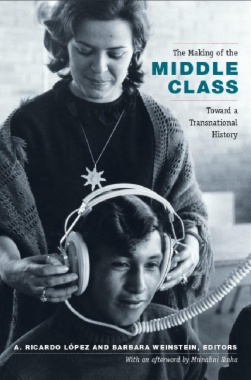In this important and timely collection of essays, historians reflect on the middle class: what it is, why its struggles figure so prominently in discussions of the current economic crisis, and how it has shaped, and been shaped by, modernity. The contributors focus on specific middle-class formations around the world—in Africa, Asia, Europe, the Middle East, and the Americas—since the mid-nineteenth century. They scrutinize these formations in relation to the practices of modernity, to professionalization, to revolutionary politics, and to the making of a public sphere. Taken together, their essays demonstrate that the historical formation of the middle class has been constituted transnationally through changing, unequal relationships and shifting racial and gender hierarchies, colonial practices, and religious divisions. That history raises questions about taking the robustness of the middle class as the measure of a society's stability and democratic promise. Those questions are among the many stimulated by The Making of the Middle Class, which invites critical conversation about capitalism, imperialism, postcolonialism, modernity, and our neoliberal present.
Contributors. Susanne Eineigel, Michael A.Ervin, Iñigo García-Bryce, Enrique Garguin, Simon Gunn, Carol E. Harrison, Franca Iacovetta, Sanjay Joshi, Prashant Kidambi, A. Ricardo López, Gisela Mettele, Marina Moskowitz, Robyn Muncy, Brian Owensby, David S. Parker, Mrinalini Sinha, Mary Kay Vaughan, Daniel J. Walkowitz, Keith David Watenpaugh, Barbara Weinstein, Michael O. West
- Contents
- Acknowledgments
- Introduction: We Shall Be All: Toward a Transnational History of the Middle Class
- Part I: The Making of the Middle Class and Practices of Modernity
- Thinking about Modernity from the Margins: The Making of a Middle Class in Colonial India
- The African Middle Class in Zimbabwe: Historical and Contemporary Perspectives
- Between Modernity and Backwardness: The Case of the English Middle Class
- ‘‘Aren’t We All?’’ Aspiration, Acquisition, and the American Middle Class
- The Gatekeepers: Middle-Class Campaigns of Citizenship in Early Cold War Canada
- Commentary on Part I
- Part II: Labor Professionalization, Class Formation, and State Rule
- The Conundrum of the Middle-Class Worker in the Twentieth-Century United States: The Professional-Managerial Workers’ (Folk) Dance around Class
- Becoming Middle Class: The Local History of a Global Story—Colonial Bombay, 1890–1940
- Conscripts of Democracy: The Formation of a Professional Middle Classin Bogotá during the 1950s and Early 1960s
- The Formation of the Revolutionary Middle Class during the Mexican Revolution
- Commentary on Part II
- Part III: Middle-Class Politics in Revolution
- A Middle-Class Revolution: The Apra Party and Middle-Class Identity in Peru, 1931–1956
- Revolutionary Promises Encounter Urban Realities for Mexico City’s Middle Class, 1915–1928
- Being Middle Class and Being Arab: Sectarian Dilemmas and Middle-Class Modernity in the Arab Middle East, 1908–1936
- Commentary on Part III
- Part IV: Middle-Class Politics and the Making of the Public Sphere
- The City as a Field of Female Civic Action: Women and Middle-Class Formation in Nineteenth-Century Germany
- Putting Faith in the Middle Class: The Bourgeoisie, Catholicism, and Postrevolutionary France
- Siúticos, Huachafos, Cursis, Arribistas, and Gente de Medio Pelo: Social Climbers and the Representation of Class in Chile and Peru, 1860–1930
- ‘‘Los Argentinos Descendemos de los Barcos’’: The Racial Articulation of Middle-Class Identity in Argentina, 1920–1960
- Commentary on Part IV
- Afterword
- Bibliography
- Contributors
- Index

